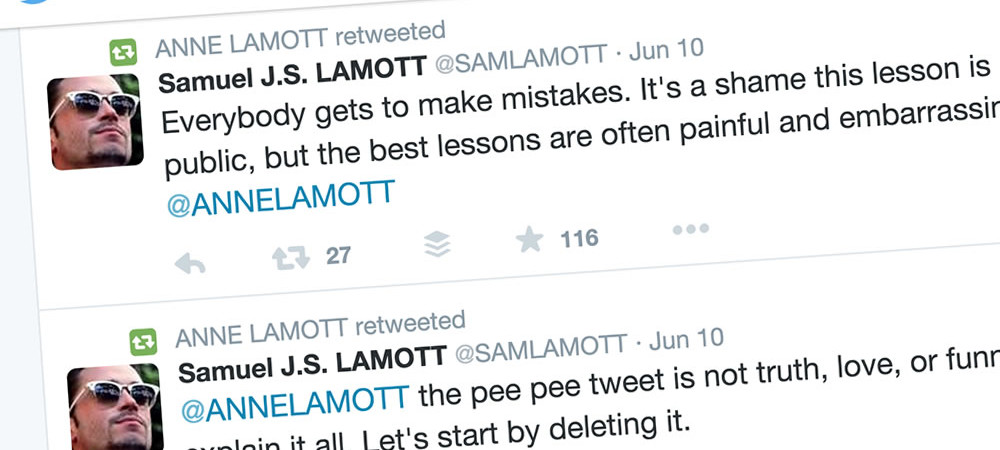Anne Lamott and the Pee-Pee Tweet
June 13, 2015OK, honey, you know we love you, right? We love your novels and your essays and your memoirs and your wonderful Facebook posts. We love that you see your own imperfections, which look so much like ours, and that you are so clear that God treasures each of us in the presence of those imperfections, not in spite of them.
So…maybe now would be an OK time to talk about mistakes? Like how each of us thinks small, snitty things about public figures, and how maybe we are smaller and snittier when it comes to public figures who are featured on horrible TV shows about people being rich for the sake of being rich? And maybe we say those small, snitty things to our friends, although, if you think about it, we wouldn’t necessarily expect God to think they were all that funny if Howard him/her/itself were in on the conversation.
So it’s good to remember that Twitter is a place where when you say things out in front of God and Everybody the Everybody is millions of actual people. And so if you say that you will call Caitlyn Jenner “she” after the pee-pee is gone then you should assume that some of the Everybody, or their loved ones, probably do have a pee-pee, but still live as women. Actual women. Because you know who gets to decide that? The person living in the body. And really, it doesn’t matter if you want to use a different definition of what makes a woman, like having a vagina or two X chromosomes. Because what is polite and kind and responsible is to treat people the way they want to be treated.
If your friend changes her name because she gets married or gets a divorce or just decides she would prefer a different name, you call her by the name she chose. Because she chose it, and any thing else would be disrespectful, even if it’s awkward to get used to the new name. And if you (by which I mean we) have spent your life using the word “retarded” to mean anything that is not as good as it should be, but a friend says that it hurts their feelings to hear that word because it’s derogatory to people who are developmentally delayed, then, you know what? You don’t argue that “retarded” means “slowed down,” and is linguistically the same as “developmentally delayed,” which is somehow fine, any more than you argue that you should say “colored people,” which means exactly the same thing as “people of color,” except that it doesn’t.
You don’t get to choose how you will talk about people, because you don’t get to choose how people feel. OK, you do get to choose how you will talk, but do you really want to go out of your way to hurt people’s feelings? To tell them that you don’t believe they are who they say they are, that they don’t get to choose language that invites them into feeling that they are genuine citizens of the world and family members in the kin-dom of God?
There are plenty of people who will say that this attitude is “politically correct,” and that no one has the right to make them feel uncomfortable by expecting them to change the words they use. But I know that you know that words have power. And that we can use our words to exert our power over other people in some pretty ugly ways. And I just can’t imagine that’s what’s in your heart. I know you have a good heart. Snarky, but good, which is just what we like best.
But, as your son Sam so gracefully put it “the pee-pee tweet is not truth, love or funny.” So here is where you get to use your superpowers for good, and use your enormous gift for language to talk with us about making mistakes, and about being embarrassed and ashamed, and about learning and growing and committing yet again to walking the path of love.
- REsources for Living - December 1, 2020
- A Fond Goodbye - December 1, 2020
- REsources for Living - November 1, 2020
Renew Your Membership
We invite you to join your fellow CLFers to renew your CLF membership and stewardship of the CLF for another year.
Support the CLF
Can you give $5 or more to sustain the ministries of the Church of the Larger Fellowship?
If preferred, you can text amount to give to 84-321
Newsletter Signup
About
Quest for Meaning is a program of the Church of the Larger Fellowship (CLF).
As a Unitarian Universalist congregation with no geographical boundary, the CLF creates global spiritual community, rooted in profound love, which cultivates wonder, imagination, and the courage to act.
Contact
Church of the Larger Fellowship Unitarian Universalist (CLFUU)
24 Farnsworth Street
Boston MA 02210



